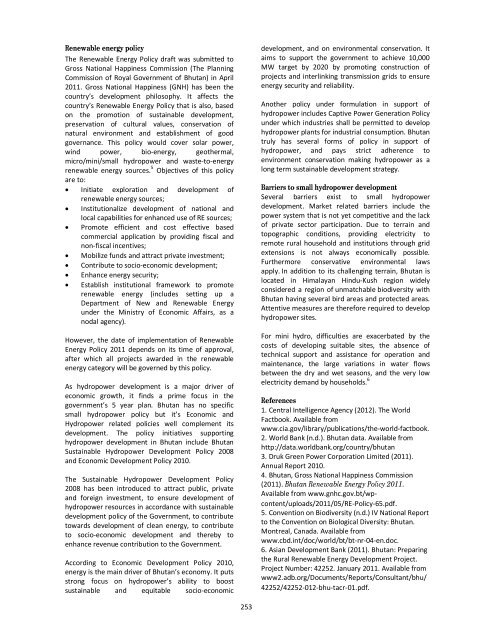WSHPDR_2013_Final_Report-updated_version
WSHPDR_2013_Final_Report-updated_version
WSHPDR_2013_Final_Report-updated_version
Create successful ePaper yourself
Turn your PDF publications into a flip-book with our unique Google optimized e-Paper software.
Renewable energy policy<br />
The Renewable Energy Policy draft was submitted to<br />
Gross National Happiness Commission (The Planning<br />
Commission of Royal Government of Bhutan) in April<br />
2011. Gross National Happiness (GNH) has been the<br />
country’s development philosophy. It affects the<br />
country’s Renewable Energy Policy that is also, based<br />
on the promotion of sustainable development,<br />
preservation of cultural values, conservation of<br />
natural environment and establishment of good<br />
governance. This policy would cover solar power,<br />
wind power, bio-energy, geothermal,<br />
micro/mini/small hydropower and waste-to-energy<br />
renewable energy sources. 5 Objectives of this policy<br />
are to:<br />
Initiate exploration and development of<br />
renewable energy sources;<br />
Institutionalize development of national and<br />
local capabilities for enhanced use of RE sources;<br />
Promote efficient and cost effective based<br />
commercial application by providing fiscal and<br />
non-fiscal incentives;<br />
Mobilize funds and attract private investment;<br />
Contribute to socio-economic development;<br />
Enhance energy security;<br />
Establish institutional framework to promote<br />
renewable energy (includes setting up a<br />
Department of New and Renewable Energy<br />
under the Ministry of Economic Affairs, as a<br />
nodal agency).<br />
However, the date of implementation of Renewable<br />
Energy Policy 2011 depends on its time of approval,<br />
after which all projects awarded in the renewable<br />
energy category will be governed by this policy.<br />
As hydropower development is a major driver of<br />
economic growth, it finds a prime focus in the<br />
government’s 5 year plan. Bhutan has no specific<br />
small hydropower policy but it’s Economic and<br />
Hydropower related policies well complement its<br />
development. The policy initiatives supporting<br />
hydropower development in Bhutan include Bhutan<br />
Sustainable Hydropower Development Policy 2008<br />
and Economic Development Policy 2010.<br />
The Sustainable Hydropower Development Policy<br />
2008 has been introduced to attract public, private<br />
and foreign investment, to ensure development of<br />
hydropower resources in accordance with sustainable<br />
development policy of the Government, to contribute<br />
towards development of clean energy, to contribute<br />
to socio-economic development and thereby to<br />
enhance revenue contribution to the Government.<br />
According to Economic Development Policy 2010,<br />
energy is the main driver of Bhutan’s economy. It puts<br />
strong focus on hydropower’s ability to boost<br />
sustainable and equitable socio-economic<br />
development, and on environmental conservation. It<br />
aims to support the government to achieve 10,000<br />
MW target by 2020 by promoting construction of<br />
projects and interlinking transmission grids to ensure<br />
energy security and reliability.<br />
Another policy under formulation in support of<br />
hydropower includes Captive Power Generation Policy<br />
under which industries shall be permitted to develop<br />
hydropower plants for industrial consumption. Bhutan<br />
truly has several forms of policy in support of<br />
hydropower, and pays strict adherence to<br />
environment conservation making hydropower as a<br />
long term sustainable development strategy.<br />
Barriers to small hydropower development<br />
Several barriers exist to small hydropower<br />
development. Market related barriers include the<br />
power system that is not yet competitive and the lack<br />
of private sector participation. Due to terrain and<br />
topographic conditions, providing electricity to<br />
remote rural household and institutions through grid<br />
extensions is not always economically possible.<br />
Furthermore conservative environmental laws<br />
apply. In addition to its challenging terrain, Bhutan is<br />
located in Himalayan Hindu-Kush region widely<br />
considered a region of unmatchable biodiversity with<br />
Bhutan having several bird areas and protected areas.<br />
Attentive measures are therefore required to develop<br />
hydropower sites.<br />
For mini hydro, difficulties are exacerbated by the<br />
costs of developing suitable sites, the absence of<br />
technical support and assistance for operation and<br />
maintenance, the large variations in water flows<br />
between the dry and wet seasons, and the very low<br />
electricity demand by households. 6<br />
References<br />
1. Central Intelligence Agency (2012). The World<br />
Factbook. Available from<br />
www.cia.gov/library/publications/the-world-factbook.<br />
2. World Bank (n.d.). Bhutan data. Available from<br />
http://data.worldbank.org/country/bhutan<br />
3. Druk Green Power Corporation Limited (2011).<br />
Annual <strong>Report</strong> 2010.<br />
4. Bhutan, Gross National Happiness Commission<br />
(2011). Bhutan Renewable Energy Policy 2011.<br />
Available from www.gnhc.gov.bt/wpcontent/uploads/2011/05/RE-Policy-65.pdf.<br />
5. Convention on Biodiversity (n.d.) IV National <strong>Report</strong><br />
to the Convention on Biological Diversity: Bhutan.<br />
Montreal, Canada. Available from<br />
www.cbd.int/doc/world/bt/bt-nr-04-en.doc.<br />
6. Asian Development Bank (2011). Bhutan: Preparing<br />
the Rural Renewable Energy Development Project.<br />
Project Number: 42252. January 2011. Available from<br />
www2.adb.org/Documents/<strong>Report</strong>s/Consultant/bhu/<br />
42252/42252-012-bhu-tacr-01.pdf.<br />
253


